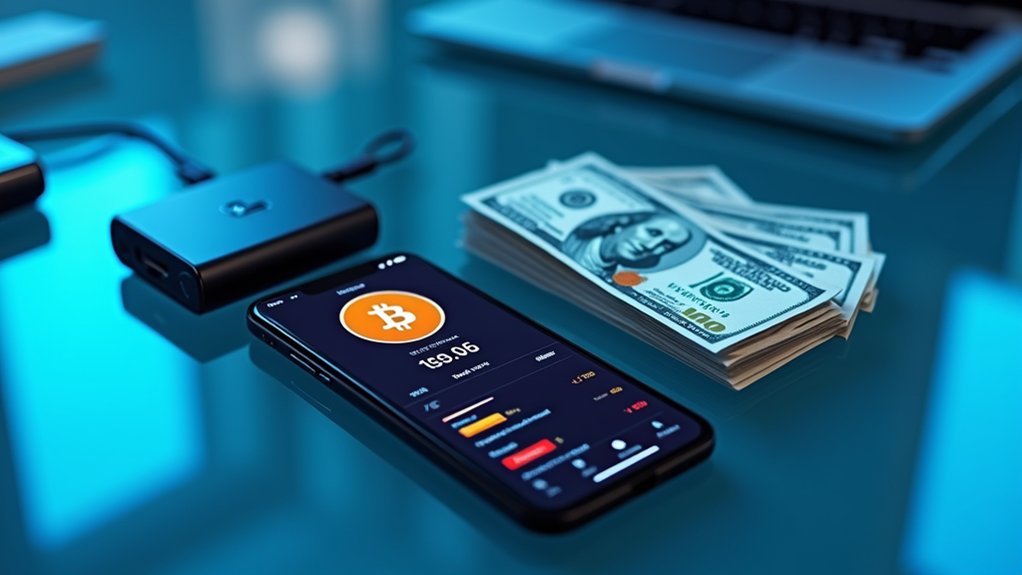Converting cryptocurrency to USD can be accomplished through several methods, including cryptocurrency exchanges like Binance.US or Kraken, brokerage accounts like Robinhood, peer-to-peer platforms, or Bitcoin ATMs. Each option presents different fee structures, processing timeframes, and security considerations. Investors should remain mindful of tax consequences, since crypto sales typically trigger capital gains obligations that vary based on holding periods. Market volatility during the conversion process may considerably impact the final amount received, warranting careful timing and strategic planning for ideal results.

Converting cryptocurrency holdings into United States dollars represents a fundamental transaction for investors seeking liquidity, profit realization, or protection from market volatility. This conversion process can be executed through various methodologies, each presenting distinct advantages and limitations that warrant careful consideration.
Cryptocurrency exchanges like Binance.US and Kraken offer direct conversion services, with Binance.US remarkably providing 0% transaction fees, thereby maximizing the retention of investment value during liquidation procedures.
Alternative conversion mechanisms include brokerage accounts like Robinhood and Webull, which facilitate integrated trading experiences for investors already utilizing traditional financial platforms. Canadians have additional options like Coinbase or Bitbuy which provide high liquidity rates but require identity verification. For those preferring direct person-to-person transactions, peer-to-peer platforms implement escrow services that mitigate counterparty risk while potentially avoiding standard exchange fees, although these transactions necessitate heightened due diligence regarding buyer credibility.
Bitcoin ATMs present a physical conversion option, allowing immediate access to cash currency, albeit typically accompanied by substantial commission costs that must be factored into conversion calculations.
The procedural aspects of conversion vary by platform, generally requiring account authentication, selection of appropriate trading pairs, and transaction confirmation. Many platforms implement cold storage security protocols and encrypted transactions, though investors should invariably employ two-factor authentication to fortify account security. The best services offer quick & easy exchanges with simple interfaces requiring just a few clicks for completion of transactions. It's important to note that all cryptocurrency trades are executed immediately and cannot be canceled once initiated.
The emergence of spot Bitcoin ETFs has further diversified conversion options, enabling traditional brokerage account holders to engage with cryptocurrency markets through regulated investment vehicles.
Tax consequences remain a critical consideration during conversion activities, as cryptocurrency sales trigger capital gains tax obligations in most jurisdictions. Investors must meticulously document the cost basis and sale amounts to accurately calculate tax liability, which varies depending on the holding period classification as either short-term or long-term investments.
Alternative liquidation strategies include crypto-backed loans, which enable USD access without triggering taxable events, and cryptocurrency debit cards that permit direct spending without formal conversion procedures.
Market volatility represents an omnipresent risk factor during conversion processes, potentially affecting exchange rates between initiation and completion of transactions; hence timing considerations may considerably impact realized values.
Frequently Asked Questions
Are There Tax Implications When Converting Cryptocurrency to USD?
Converting cryptocurrency to USD triggers taxable events with significant consequences for investors.
The IRS classifies these conversions as disposals of property, resulting in capital gains tax obligations based on the difference between acquisition cost and sale value.
These transactions must be reported on IRS Forms 8949 and Schedule D, with tax rates varying according to holding period, investor income bracket, and whether gains qualify as short-term or long-term capital gains.
How Long Does It Take to Receive USD After Selling Crypto?
USD receipt after cryptocurrency liquidation typically ranges from 10 seconds to 2 business days, contingent upon the selected payout method and potential processing variables.
Fast Funds/Banking RTP facilitates near-immediate settlements, whereas standard transfers require additional processing time.
Security protocols, KYC threshold exceedances, or blockchain network congestion may introduce supplementary delays of approximately one business day, particularly during periods of elevated transaction volume or enhanced verification requirements.
Which Crypto Exchange Has the Lowest Fees for USD Conversion?
For USD conversion, MEXC offers the lowest fees with zero-fee spot trading (0% maker/taker).
Meanwhile, Bitget provides competitive rates at 0.02% maker/0.06% taker for derivatives.
Kraken and Coinbase, despite higher trading fees, offer free ACH/SEPA deposits and withdrawals, making them cost-effective for fiat transactions.
Strategic approaches include using stablecoin intermediaries first, batching withdrawals to reduce blockchain fees, and considering volume-based discounts available on platforms like OKX and Kraken.
Can I Transfer USD Directly to My Bank Account?
Yes, USD can be transferred directly to a bank account through several methods, including ACH transfers (taking 0-3 business days), same-day wire transfers for larger amounts, or bank-to-bank transfers.
The recipient's complete banking details are required, including account number, routing number, and account type specification.
Transfer limits vary by method, with ACH allowing up to $1M and wire transfers supporting up to $6M, though fees may apply depending on the financial institution.
Do I Need to Verify My Identity to Convert Crypto to USD?
Identity verification is indeed required when converting cryptocurrency to USD on most regulated exchanges.
Financial institutions must comply with Know Your Customer (KYC) and Anti-Money Laundering (AML) regulations, necessitating identity confirmation before completing fiat transactions.
While basic verification tiers may permit limited crypto trading, full conversion capabilities, including USD withdrawals to bank accounts, typically require advanced verification with government-issued photo identification, proof of address, and possibly facial recognition verification.









